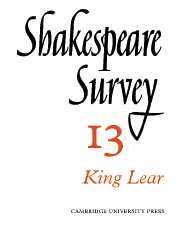Book contents
- Frontmatter
- The Catharsis of King Lear
- Lear’s Last Speech
- Albany
- Madness in King Lear
- The Influence of Gorboduc on King Lear
- Some Aspects of the Style of King Lear
- Keats and King Lear
- King Lear on the Stage: A Producer’s Reflections
- Costume in King Lear
- The Marriage-Contracts in Measure for Measure
- Tom Skelton—A Seventeenth-century Jester
- Illustrations of Social Life III: Street-Cries
- An Elizabethan Stage Drawing?
- Was there a Music-room in Shakespeare’s Globe?
- International Notes
- Shakespeare Productions in the United Kingdom: 1958
- Three Adaptations
- The Year's Contributions to Shakespearian Study 1 Critical Studies
- 2 Shakespeare’s Life, Times and Stage
- 3 Textual Studies
- Books Received
- Index
- Plate Section
The Influence of Gorboduc on King Lear
Published online by Cambridge University Press: 28 March 2007
- Frontmatter
- The Catharsis of King Lear
- Lear’s Last Speech
- Albany
- Madness in King Lear
- The Influence of Gorboduc on King Lear
- Some Aspects of the Style of King Lear
- Keats and King Lear
- King Lear on the Stage: A Producer’s Reflections
- Costume in King Lear
- The Marriage-Contracts in Measure for Measure
- Tom Skelton—A Seventeenth-century Jester
- Illustrations of Social Life III: Street-Cries
- An Elizabethan Stage Drawing?
- Was there a Music-room in Shakespeare’s Globe?
- International Notes
- Shakespeare Productions in the United Kingdom: 1958
- Three Adaptations
- The Year's Contributions to Shakespearian Study 1 Critical Studies
- 2 Shakespeare’s Life, Times and Stage
- 3 Textual Studies
- Books Received
- Index
- Plate Section
Summary
The fact that Shakespeare rarely composed original plots is as universally known as the fact that it is his treatment of old plots that sets his work so far above his sources. One cannot but wonder, however, at the reasons which may have led him to the choice of each particular story, or avoid pondering on the influence which may have weighed on the decision about the dramatic tone of the play at hand. Obviously, most themes carry in themselves the seed of their own dramatic category, but a certain element of personal conception is always present: Richard II and Richard III, for example, contain dramatic tendencies which are absent in Henry VI, Henry IV and Henry V, and yet Shakespeare went to the same sources for all of them; and there is an indisputable element of personal approach in Shakespeare’s use of Roman historic material in the tragic or quasi-tragic Julius Caesar and Antony and Cleopatra.
- Type
- Chapter
- Information
- Shakespeare Survey , pp. 41 - 48Publisher: Cambridge University PressPrint publication year: 1960
- 1
- Cited by

